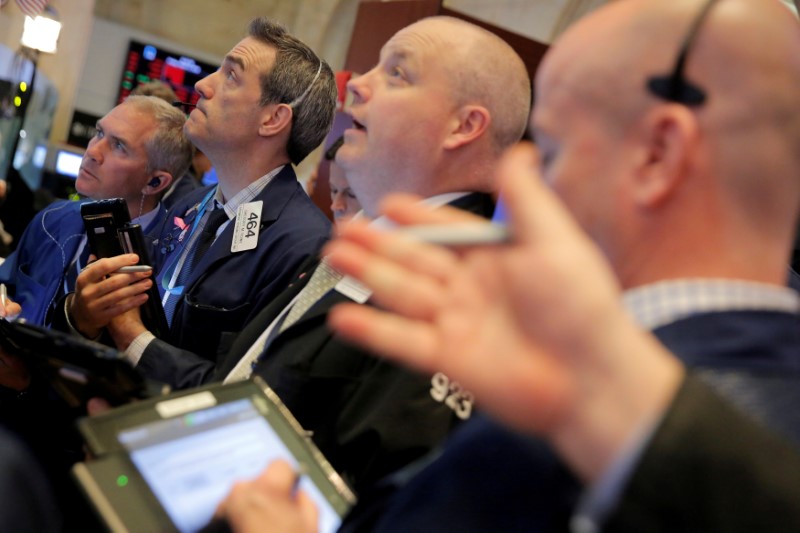LONDON (Reuters) - Following are five big themes likely to dominate thinking of investors and traders in the coming week and the Reuters stories related to them.
1/ GAME OF TWO HALVES
It has been the worst first-half of a year for global stocks since 2010 as a mix of U.S.-China trade tensions, central banks turning off the money taps and cooling growth in Europe wiped a trillion dollars off MSCI's 47-country world index.
But let us put that behind us - Monday is the first trading day of the second 2018 half. What lies ahead?
What is certain is that the U.S. Fed will raise interest rates again, at least once, possibly twice. The ECB will end its bond-buying at the end of December. The Bank of England, the Bank of Canada and some big emerging market central banks will also raise interest rates.
The question is whether more misery lies in store for assets such as Chinese stocks which have entered bear-market territory. The yuan's fate will be key to other emerging markets too after losses of 5-8 percent on stocks and bonds.
So who will emerge the winner? At this point it is the FAANG U.S. tech stocks which collectively are up almost 40 percent. Whether the gains continue may depend on trade politics and Fed policy - a more aggressive Fed could ensure 10-year yields rise above 3 percent again and stay there.
GRAPHIC: World stocks have worst H1 since 2010-https://reut.rs/2IyNguk
2/ SHIFTING UP A GEAR
The Sino-U.S. trade conflict is about to shift into a higher gear, with additional tariffs on Chinese imports kicking in on July 6. Respective market moves indicate the United States has won Round One of the tariff war - the yuan just clocked up its worst month on record while China's stock market suffered its deepest monthly slide since January 2016.
Next week, the yuan will take centre-stage as investors wonder what action, if any, Beijing might take to stem the currency's slide. Chinese policymakers are known for their readiness to intervene in the economy and financial markets and economy at any opportunity but they seem less interventionist this time.
This could of course show commitment to a long-promised liberalisation process. More likely though, authorities are signalling their readiness to use yuan weakness as a response to U.S. import tariffs.
The risk is that an extended sell-off feeds off itself, sparking capital outflows. Without an easing in trade tensions it's hard to see the yuan moves reversing, unless manufacturing and service sector surveys next week provide some relief.
China's yuan staring at worst month ever as trade war roils investors. China further eases foreign investment curbs
Ambassador says U.S. unconvinced China willing to make fast progress on trade Trump to use U.S. security review panel to curb China tech investments.
GRAPHIC - China's Yuan: https://reut.rs/2N6rpho
3/ THIRD TIME LUCKY?
Elections frenzy continues in emerging markets and after Turkey last week, it's Mexico's turn on Sunday. Polls predict that former Mexico City mayor Andres Manuel Lopez Obrador will be the next president, possibly garnering over half of the votes.
This is the third bid for the key job by AMLO as the leftist Lopez Obrador is commonly known; his popularity has grown hand in hand with Mexicans' anger at the failure of traditional parties to end record levels of violence and corruption.
His history of protest politics has unnerved investors though and while throughout this campaign AMLO has courted Wall Street, he has still pledged to review a 2013 opening of the oil industry to private producers.
The vote comes at a delicate point for Mexico, which is at odds with the United States over migration and trade, while talks on reworking the NAFTA trade agreement are deadlocked. The new president will have to steer his country through these issues.
The peso sank to a 1-1/2-year low in June, though its weakness has mostly been blamed on a global emerging market sell-off. AMLO's election win looks already priced in.
GRAPHIC - Mexico GDP: https://reut.rs/2tFTm7J
4/ WUNDERBAR
An EU deal to share out refugees on a voluntary basis and create "controlled centres" to process asylum requests has thrown a lifeline to German Chancellor Angela Merkel, whose coalition government has been teetering on the brink of collapse.
Bavaria's Christian Social Union meets on Sunday to decide whether that deal addresses its concerns. If not, it could make good on a promise to unilaterally introduce tougher immigration controls, potentially shattering its alliance with Merkel's Christian Democrats and toppling her three-month-old government.
But hopes a political crisis has been averted sent the euro and stock markets rallying on Friday. The gains could extend should the CSU give the agreement the thumbs-up.
Italian debt has been the other beneficiary from the migrant deal. Investors, possibly, have interpreted the compromise by Rome's anti-establishment government with EU peers as boding well for similarly contentious talks on Italian budget policies later this year.
GRAPHIC - Migrant deal cheers European markets: https://reut.rs/2tFfmjb
5/ HOW LOW WILL IT GO?
June's U.S. unemployment data, due Friday, will be closely-watched for further signs of a tightening labour market.
Unemployment data for May boosted markets, with the rate falling to an 18-year low, pointing to strength in the U.S. economy, and helping send stocks up around 1 percent that day.
Nonfarm payrolls surged by 223,000 jobs during that month as warm weather bolstered hiring at construction sites. June's data is expected to show a 200,000 increase, according to a Reuters poll.
The closely-watched hourly wages in May rose 0.3 percent, topping economists' estimates. The same figure is expected in June.
U.S. job growth surges, unemployment rate falls to 3.8 percent
U.S. weekly jobless claims drop as labor market picks up steam
Chance for continued U.S. job gains an argument for low rates -Fed's Bullard

GRAPHIC -U.S. unemployment: https://reut.rs/2IGP1pK